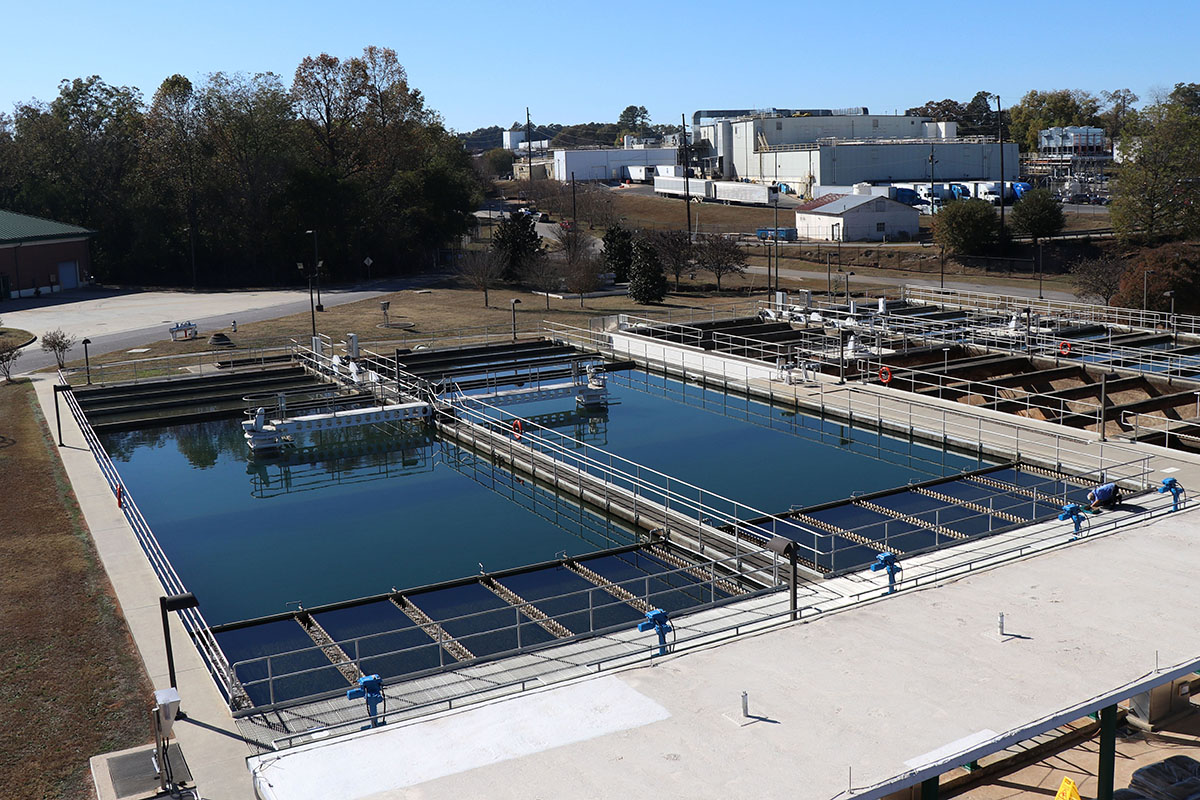University of Georgia researcher Gary Hawkins is working to remove long-lasting chemicals from Georgia’s waterways.
Per- and Polyfluoroalkyl Substances (PFAS), also known as “forever chemicals,” have posed a threat to Georgians and others across the globe for years.
Hawkins is a water resource management specialist for UGA Cooperative Extension in the Department of Crop and Soil Sciences. He works on outreach efforts throughout Georgia to educate stakeholders on implementing treatments for PFAS contamination in waterways.
Why It’s Newsworthy: In February, the U.S. Environmental Protection Agency (EPA) announced that the Biden-Harris Administration will give $54 million to clean up emerging contaminants like Per- and Polyfluoroalkyl Substances (PFAS) in drinking water in Georgia.What is PFAS?
Per- and Polyfluoroalkyl Substances (PFAS) are long-lasting chemicals that are widely used and can be found in everyday products: cleaning supplies, water-resistant fabrics, grease-resistant paper, nonstick cookware, shampoo, dental floss, etc., according to the EPA.

It starts with the source: consumers and producers. It does not take much for PFAS to enter the waterways. PFAS can easily enter the municipal drinking water supply, Hawkins said. Some ways include washing non-stick dishes with Teflon, washing off makeup and washing waterproof clothing in the washing machine.
As for the manufacturers, the EPA published a final rule in October that requires all manufacturers and importers of PFAS in any year since 2011 to report information about PFAS uses, production volumes, disposal, exposures and hazards.
Manufacturers are slowing their use of PFAS by taking it out completely or altering their formulas. But products with PFAS still remain in homes, Hawkins says.
“If you’ve got this stuff in your make-up, how long is it going (to) take you to get rid of all your make-up? And how long is it going to take the tens of thousands of others that use that same make-up to get it out?” Hawkins said. “As long as those products are still out there, this stuff potentially can get in our water and wastewater system.”
Even with treatment technology, the timeline of when PFAS will be cleared from waterways remains uncertain. PFAS can still get into the waterways as long as these products exist in homes.
What are the Dangers of PFAS?
PFAS isn’t only found in products and pans; it is found in human blood across the globe, including 99% of Americans, according to the Environmental Working Group.
Jesse Demonbreun-Chapman, the executive director and riverkeeper at the Coosa River Basin Initiative, said PFAS started as two different specific chemicals, but this number has grown from anywhere between five and 7,000 different specifications, depending on the source.
With so many specifications, he says, the EPA is only able to establish the legal enforceable limits of some PFAS. The other specifics fall under health advisory warnings.
“If we’re waiting for EPA to get enough information on each individual chemical to decide that they’re harmful (and that) they need to be kept out of drinking water, … we’re all in big trouble,” Demonbreun-Chapman said.
Rather than each specific chemical being regulated, he says, the EPA needs to establish a way to group these chemicals together. This way, PFAS can be treated and regulated as a class.
“There’s going to be kind of just a steady march of technological advances that will help us address this issue. But… in the meantime, people need to be made aware of their… exposure, and we need to have regulations,” Demonbreun-Chapman said.
What’s Working
-
PFAS Shut Maine Farms Down. Now, Some Are Rebounding.
Since testing by the Maine Department of Environmental Protection found shockingly high levels of PFAS and PFOS — also known as forever chemicals — on land across the state, researchers and locals have been working on remediation. In one example, the Aroostook Band of the Mi’kmaq found that hemp grown on contaminated land extracts large amounts of the chemicals from the soil.
What Progress is Being Made?
Hawkins and other researchers on his team — including researchers from the UGA Griffin campus and the Georgia Institute of Technology — are evaluating PFAS from the water samples from three different wastewater treatment plants, which Hawkins did not disclose.
The team evaluates the efficiency of the technology that removes PFAS. To do this, the team analyzes the removal rates of the chemicals from the water samples, Hawkins said. Hawkins brings the findings to city and county officials to evaluate if the technology is economically viable. He predominantly looks at whether it is feasible for rural communities. Similar to scientists, Hawkins says, the officials are still learning.
Since different technologies are able to remove PFAS from the water on a lab scale, he said the outlook is positive.
But “the next question is, how do we scale that up?” Hawkins said.
The $54 million given to Georgia is not enough to clean up PFAS in drinking water, Demonbreun-Chapman said. It was always meant to be just a nod toward the issue.
“We are going to be overwhelmed by the sheer scale of… just addressing the drinking water side, and that doesn’t even keep it out of the environment,” Demonbreun-Chapman said.
The limitation, he says, is that the technology does not provide equitable mechanisms for those on private drinking water wells. A lot of them may be completely unaware of the chemicals they are consuming. He said the federal government needs to give these well owners access to sampling to identify any PFAS contamination.
“We are likely to be… at the beginning, not at the middle or the end of this issue. This is going to be wrestled with for decades,” Demonbreun-Chapman said.
Allyson Reynolds is a fourth-year student majoring in journalism, minoring in sociology, and with a certificate in sustainability.







Show Comments (0)